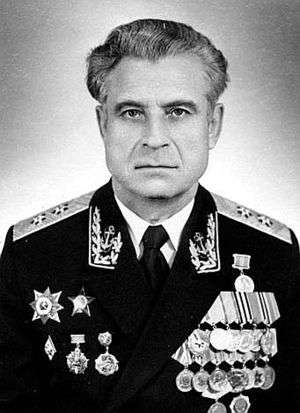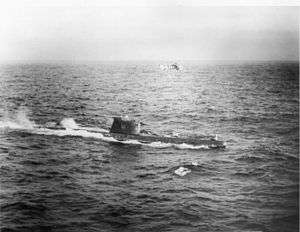Vasili Arkhipov
| Vasili Alexandrovich Arkhipov | |
|---|---|
 | |
| Native name | Василий Александрович Архипов |
| Born |
30 January 1926 Zvorkovo, Moscow Oblast, Russian SFSR, Soviet Union |
| Died |
19 August 1998 (aged 72) Zheleznodorozhny, Moscow Oblast, Russia |
| Allegiance |
|
| Service/branch |
|
| Years of service | 1945–1980s |
| Rank |
|
| Battles/wars | |
| Awards | |
Vasili Alexandrovich Arkhipov (Russian: Василий Александрович Архипов) (30 January 1926 – 19 August 1998) was a Soviet Navy officer who is credited with casting the single vote that prevented a Soviet nuclear strike (and presumably all out nuclear war) during the Cuban Missile Crisis. Only Arkhipov, as flotilla commander and second-in-command of the nuclear-missile submarine B-59, refused to authorize the captain's use of nuclear torpedoes against the United States Navy, a decision requiring the agreement of all three senior officers aboard. In 2002 Thomas Blanton, who was then director of the US National Security Archive, said that "Vasili Arkhipov saved the world".[1]
Early life
Arkhipov was born into a peasant family near Moscow. He was educated in the Pacific Higher Naval School and participated in the Soviet–Japanese War in August 1945, serving aboard a minesweeper. He transferred to the Caspian Higher Naval School and graduated in 1947.[2]
Career
After graduating in 1947, Arkhipov served in the submarine service aboard boats in the Black Sea, Northern and Baltic Fleets.[2]
K-19 accident
In July 1961, Arkhipov was appointed deputy commander or executive officer of the new Hotel-class ballistic missile submarine K-19.[2] After a few days of conducting exercises off the coast of Greenland the submarine developed an extreme leak in its reactor coolant system. This leak led to failure of the cooling system. Radio communications were also affected and the crew was unable to make contact with Moscow. With no backup systems, Commander Zateyev ordered the seven members of the engineer crew to come up with a solution to avoid nuclear meltdown. This required the men to work in high radiation levels for extended periods. They eventually came up with a secondary coolant system and were able to keep the reactor from a meltdown. Although they were able to save themselves from a nuclear meltdown the entire crew including Arkhipov were irradiated. All members of the engineer crew and their divisional officer died within a month due to the high levels of radiation they were exposed to. Over the course of two years fifteen more sailors died from the after effects.[3]
Involvement in Cuban Missile Crisis

On 27 October 1962, during the Cuban Missile Crisis, a group of eleven United States Navy destroyers and the aircraft carrier USS Randolph located the diesel-powered nuclear-armed Soviet Foxtrot-class submarine B-59 near Cuba. Despite being in international waters, the Americans started dropping practice signaling depth charges, explosives intended to force the submarine to come to the surface for identification. There had been no contact from Moscow for a number of days and, although the submarine's crew had earlier been picking up U.S. civilian radio broadcasts, once B-59 began attempting to hide from its U.S. Navy pursuers, it was too deep to monitor any radio traffic. Those on board did not know whether war had broken out or not.[5][6] The captain of the submarine, Valentin Grigorievitch Savitsky, decided that a war might already have started and wanted to launch a nuclear torpedo.[7]
Unlike the other subs in the flotilla, three officers on board the B-59 had to agree unanimously to authorize a nuclear launch: Captain Savitsky, the political officer Ivan Semonovich Maslennikov, and the second-in-command Arkhipov. Typically, Russian submarines armed with the "Special Weapon" only required the captain to get authorization from the political officer to launch a nuclear torpedo. However, due to Arkhipov's position as flotilla commander, the B-59's captain also was required to gain Arkhipov's approval. An argument broke out, with only Arkhipov against the launch.[8]
Even though Arkhipov was only second-in-command of the submarine B-59, he was in fact commander of the entire submarine flotilla, including the B-4, B-36 and B-130, and equal in rank to Captain Savitsky. According to author Edward Wilson, the reputation Arkhipov had gained from his courageous conduct in the previous year's Soviet submarine K-19 incident also helped him prevail.[7] Arkhipov eventually persuaded Savitsky to surface and await orders from Moscow. This effectively averted the nuclear warfare which probably would have ensued if the nuclear weapon had been fired.[9] The submarine's batteries had run very low and the air-conditioning had failed, so it was forced to surface amidst its U.S. pursuers and head home.[10] Washington's message that practice depth charges were being used to signal the submarine to surface never reached B-59, and Moscow claims it has no record of receiving it either.
Aftermath
When discussing the Cuban Missile Crisis in 2002, Robert McNamara, who had been U.S. Secretary of Defense at the time, stated "We came very close" to nuclear war, "closer than we knew at the time."[11]
In Aleksandr Mozgovoy's 2002 book, Kubinskaya Samba Kvarteta Fokstrotov (Cuban Samba of the Foxtrot Quartet), retired Commander Vadim Pavlovich Orlov, a participant in the events, presents them less dramatically, saying that Captain Savitsky lost his temper but eventually calmed down.[12]
Later life and death
Arkhipov continued in Soviet Navy service, commanding submarines and later submarine squadrons. He was promoted to rear admiral in 1975, and became head of the Kirov Naval Academy. Arkhipov was promoted to vice admiral in 1981 and retired in the mid 1980s.
He subsequently settled in Kupavna (which was incorporated into Zheleznodorozhny, Moscow Oblast, in 2004), where he died on 19 August 1998.[2] The radiation to which Arkhipov had been exposed in 1961 contributed to his death.[7][13]
Nikolai Vladimirovich Zateyev, the commander of the submarine K-19 at the time of its onboard nuclear accident, died nine days later, on 28 August 1998. Both Arkhipov and Zateyev were 72 at the time of their deaths.
See also
- Stanislav Petrov, a Russian duty officer at a missile warning station who averted a possible nuclear war in 1983
References
- ↑ Lloyd, Marion (13 October 2002). "Soviets Close to Using A-Bomb in 1962 Crisis, Forum is Told". Boston Globe. pp. A20. Retrieved 7 August 2012.
- 1 2 3 4 Roberts, Priscilla Mary (2012). "Arkhipov, Vasili Alexandrovich". Cuban Missile Crisis: The Essential Reference Guide. Abc-Clio Inc. pp. 13–14. ISBN 9781610690652. Retrieved 11 May 2012.
- ↑ "Vasili Arkhipov: Cold War Russian hero -- Sott.net". SOTT.net. https://google.com/+SottNet. Retrieved 2015-11-09. External link in
|publisher=(help) - ↑ Burr and, William; Blanton, Thomas S., eds. (31 October 2002). "The submarines of October- U.S. and Soviet Naval Encounters During the Cuban Missile Crisis". National Security Archive Electronic Briefing Book. No. 75. Archived from the original on 11 May 2012.
- ↑ Michael Dobbs, One Minute to Midnight, Vintage, Random House, 2009. Includes photograph of B-59 surfacing.
- ↑ "Chronology of Submarine Contact During the Cuban Missile Crisis". National Security Archive of the George Washington University. Retrieved 15 November 2010.
- 1 2 3 Edward Wilson (2012-10-27). "Thank you Vasili Arkhipov, the man who stopped nuclear war". The Guardian. Retrieved 2012-10-31.
- ↑ Noam Chomsky (2004). Hegemony or Survival: America's Quest for Global Dominance. New York: Henry Holt. p. 74. ISBN 0-8050-7688-3.
- ↑ Blanton, Thomas S. (16 October 2002). "The Cuban Missile Crisis: 40 Years Later" (Interview). Interview with The Washington Post; Forum users. Archived from the original on 2008-08-30. Retrieved 15 November 2010.
- ↑ Watson, Leon, & Duell, Mark (2012-09-25). "The Man Who Saved the World". Daily Mail. Retrieved 2012-10-12.
- ↑ "'I don't think anybody thought much about whether Agent Orange was against the rules of war'". guardian.co.uk. May 19, 2002. Retrieved 22 June 2012.
- ↑ Isachsnkov, Vladimir (21 June 2002). "Russian Book Looks at Missile Crisis". johnson. Archived from the original on 2011-05-30. Retrieved 2008-05-03.
- ↑ "The Man Who Saved the World". Secrets of the Dead. PBS. 2012-10-24.